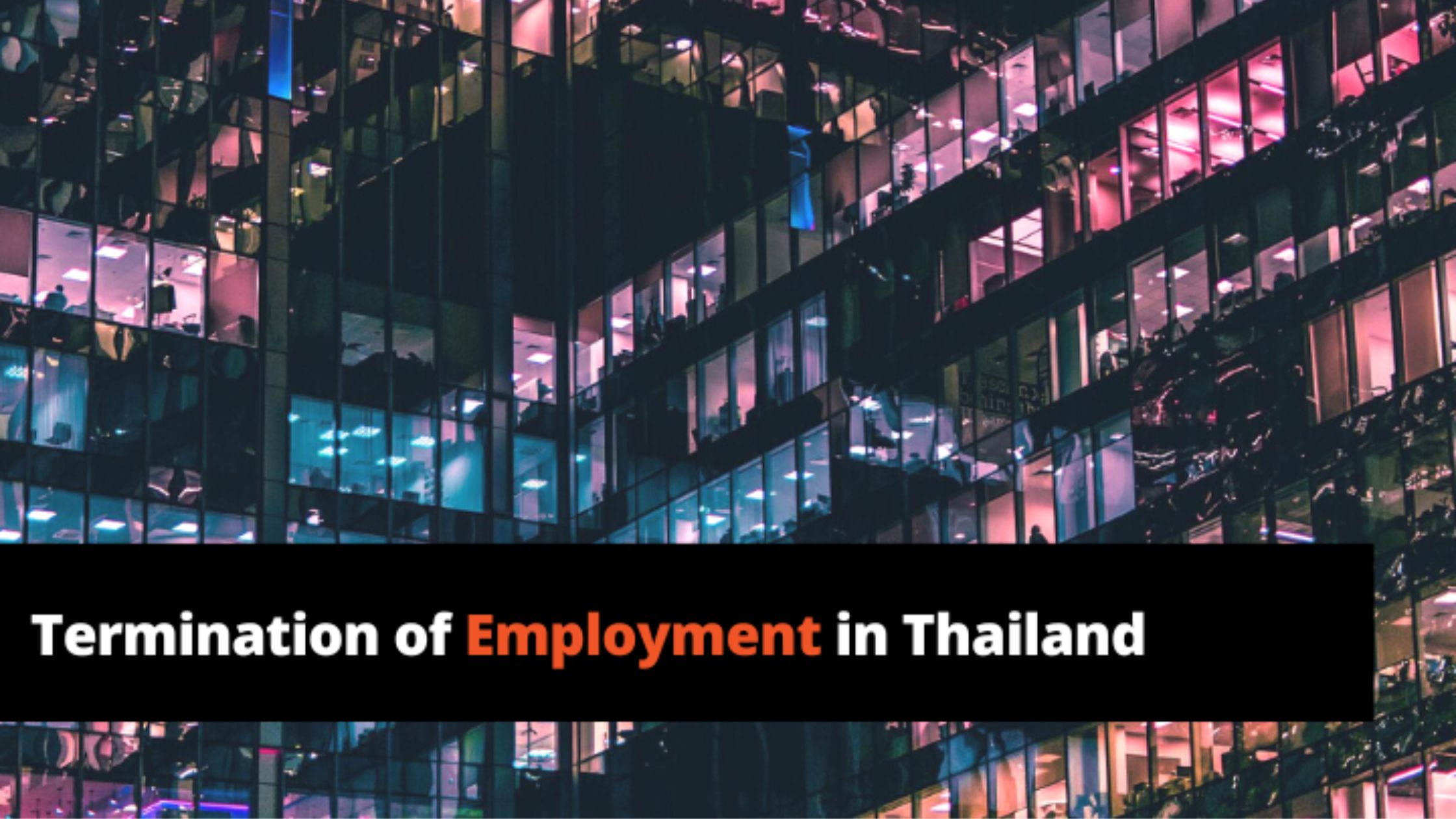August 22, 2022
According to Thai labour laws, an employer is empowered to terminate an employee’s employment at its will, except for members of the Employee Committee which requires a court order for dismissal. However, the consequences of dismissal with and without statutory causes under the Labour Protection Act B.E. 2541 (the “Labour Protection Act”) will be different in terms of the statutory payments for which the employer is legally required to pay the employee. In this regard, the question “how much statutory payment does the employer have to pay to the employee due to dismissal?” becomes one of the most concerned and critical issues for all employers. Here are key takeaways for employers and employees on statutory payments to consider when terminating or being terminated. Statutory Cause Section 583 of the Civil and Commercial Code stipulates that if the employee wilfully disobeys or habitually neglects the lawful commands of the employer, absents himself for services, is guilty of gross misconduct, or otherwise acts in a manner incompatible with the due and faithful discharge of the employee’s duty, such employee may be dismissed by the employer without notice or compensation. In addition, Section 119 of the Labour Protection Act also stipulates the statutory causes as follows: (1) Performing the duty dishonestly or intentionally committing a criminal offence against the employer; (2) Wilful acts done to cause damages to the employer; (3) Committing negligent acts causing serious damage to the employer; (4) Violating work regulations, regulation or order of the employer which is lawful and just for which the employer has already issued the employee a written warning, except in a serious instance... August 16, 2022
The Royal Decree No. 750 (B.E. 2565) issued under the Revenue Code regarding income tax exemption on investment in Thai startups (the “Royal Decree”) was recently published in the Government Gazette, in cases where the funding for the startups is provided directly or indirectly through Venture Capital (VC), Corporate Venture Capital (CVC), or private equity trust (PE Trust). This Royal Decree aims to unlock capital gains tax on investment in startups under the Royal Decree No. 597 (B.E. 2559) and No. 636 (B.E. 2560). These tax benefits are effective for ten accounting periods until 30 June 2032. The cabinet anticipates that these tax privileges will facilitate Thai startups to raise more funds from both Thai and foreign investors, leading to faster growth in gross domestic product (GDP) in Thailand, and an increase in the number of workers employed in Thailand. In order for the target investors to obtain tax exemptions for their investments in Thai startups, the criteria for a startup, the target investors, tax benefits and conditions, and exception conditions can be summarized below. 1) Startup A startup must engage in the target activities supported by the relevant government agencies as prescribed by the Committee on Policy for National Competitive Enhancement for Targeted Industries, which must use technology as the basis for their production process and services pursuant to regulations stipulated by the Director-General of the Revenue Department (the “Targeted Industries”). The government authorities which will be responsible for the issuance of the certification of the target activities are the National Science and Technology Development Agency (NSTDA) and the National Innovation Agency (NIA). Currently, there are 12 Targeted Industries as prescribed under... August 16, 2022
With its increasing population and urbanization, Thailand cannot escape from the mountains of solid waste generated in households and in communities across the country. The inappropriate disposal of solid wastes will cause serious ramifications which would be a national nightmare, such as air pollution, water pollution and contagious diseases. All of these issues are harmful not only in the environmental scale, but also in respect of the public health of each domestic sector. The government has foreseen this catastrophic event and thus declared the solid waste problem as one of its national agendas. In compliance with the first revision of the Power Development Plan 2018 (the “PDP 2018 Rev. 1”), which aimed to improve energy efficiency and foster sustainable energy and, importantly, to encourage the participation of the public with respect to energy projects, the meeting of the National Energy Policy Council (the “NEPC”) no. 3/2022 held on May 6, 2022 approved the Feed-in Tariff (the “FiT”) for waste to energy project (the “WTE Project”) under the PDP 2018 Rev. 1. This approval allows the very small power producer (the “VSPP”) and the small power producer (the “SPP”) to sell the electricity generated from solid waste from the approved 34 WTE Projects to the Electricity Generating Authority of Thailand (the “EGAT”), Metropolitan Electricity Authority (the “MEA”) and/or Provincial Electricity Authority (the “PEA”) (collectively, the “Electricity Authority”) and receive payment for the sale of electricity on the FiT basis, with the total collective capacity of 282.98 MW and the Scheduled Commercial Operation Date (the “SCOD”) between 2025 and 2026. Following this, the NEPC authorized the Energy Regulation Committee (the “ERC”) to introduce rules and regulations in relation... August 11, 2022
On June 9, 2022, Thailand delisted both cannabis and hemp plants, their unprocessed parts, and carved out extracts containing low tetrahydrocannabinol (THC) level (i.e. < 0.2% by weight) and seed oils derived from cannabis or hemp plants in Thailand from the Narcotics Code, officially becoming the first country in Asia to legalize the cultivation, sale and utilization of the plant for medical and other permitted purposes. For centuries, cannabis was used in Thailand in the form of traditional medicine, until it was banned in the 1930s due to international pressure. In 1979, Thailand’s Narcotics Act specifically designated cannabis and hemp as Category 5 illegal substances. Under this Act, the production, trade or possession of cannabis and hemp was considered a criminal act punishable by heavy fines and/or prison sentences. Thereafter, all activities related to cannabis plants and their derivatives have been highly regulated until a gradual relaxation of the applicable laws over the last few years. A market ready to get high The global hemp market was valued at USD 4.75 billion in 2020. Allied Market Research anticipates strong growth ahead, and predicts that an average annual expansion of 21.6% in the global market will expand the market to a record high of USD 18.6 billion by 2027, although this is still somewhat low compared to the world trade in cannabis. By 2025, the Thai market for hemp is forecasted to have a value of THB 15.77 billion1. The ‘Global Cannabis Market’ report estimates that in 2020, the global cannabis trade was worth USD 22.9 billion, split between USD 6.12 billion from medical marijuana (26.7% of the total) and... August 11, 2022
Conflict of interest A “Conflict of Interest” is defined as a real or seeming incompatibility between one’s private interests and one’s public or fiduciary duties (Black’s Law Dictionary – Ninth Edition). There is no statutory definition of conflict of interest under the laws of Vietnam. Actions constituting conflicts of interest are only indirectly regulated in the form of certain prohibited activities in various legal documents such as the Law on Cadres and Civil Servants 1 or the Law on Anti-corruption 2 which governs the activities of cadres and civil servants in the Governmental system. There are also provisions in the Law on Enterprises 3 governing the activities of people holding management positions in enterprises. However, in Vietnam an employee could potentially be sanctioned under the Civil Code, the Labor Code, or even criminalized under the Penal Code for the following conflicts of interest: An employee who establishes a competing business that provides the same goods or services as those of the employee’s company in the common market; The use of the proprietary information of the company, or that obtained during employment in the company, to benefit the employee’s business or the business of his/her relatives or friends; Providing goods or services to the company’s providers or clients through the business of the employee or his/her relatives or friends; Taking advantage of the employee’s position or power in the company to do business with a third party and which is not in the company’s interests; Utilization by the employee of his/her position and power in the company to allocate key employment positions, such as managers/executives, accountants, cashiers, or storekeepers, to his relatives, friends, or others for the... August 5, 2022
Ashurst ADTLaw, the Formal Law Alliance (FLA) practice of Ashurst in Singapore, has added a four-strong M&A team to its practice. Chiam Tao Koon, Ko Xiaozheng, Choo Yi Ming and George Kho join from Allen & Gledhill, a leading firm also in Singapore. This, Ashurst ADTLaw reports, “is a key milestone in Ashurst’s strategy to become a leading international firm for M&A transactions in Asia.” The team has worked together for some years already, bringing extensive cross-border M&A experience. Chiam, with 20 years of experience as a lawyer and entrepreneur specialising in deal structuring and execution for cross-border private equity transactions, takes on the additional role of Head of M&A, Southeast Asia. Ko, joining as a director, is experienced in acting for private equity funds on transactions throughout Southeast Asia and across various industry sectors, including financial services, the digital economy, projects and infrastructure. Choo, also joining as a director, has M&A experience focussing on sovereign wealth funds and large cap corporates in joint ventures and acquisitions with a particular emphasis on real estate platforms, including for data centres, industrial and logistics properties, hotels, student accommodation and offices. Kho, joining as an associate director, works with high growth startups and venture capital transactions and has industry knowledge across various sectors, including F&B, education, healthcare, insurance, construction and FMCG. Head of corporate transactions for Ashurst in Asia, Josh Cole commented, “We are thrilled to be joined by four seasoned practitioners, led by Tao Koon, an energetic, commercially and client focused senior lawyer who is known for his excellent client service. Each with a slightly different but complementary specialism, Tao Koon,... Upcoming Events
Recent Past Events
















